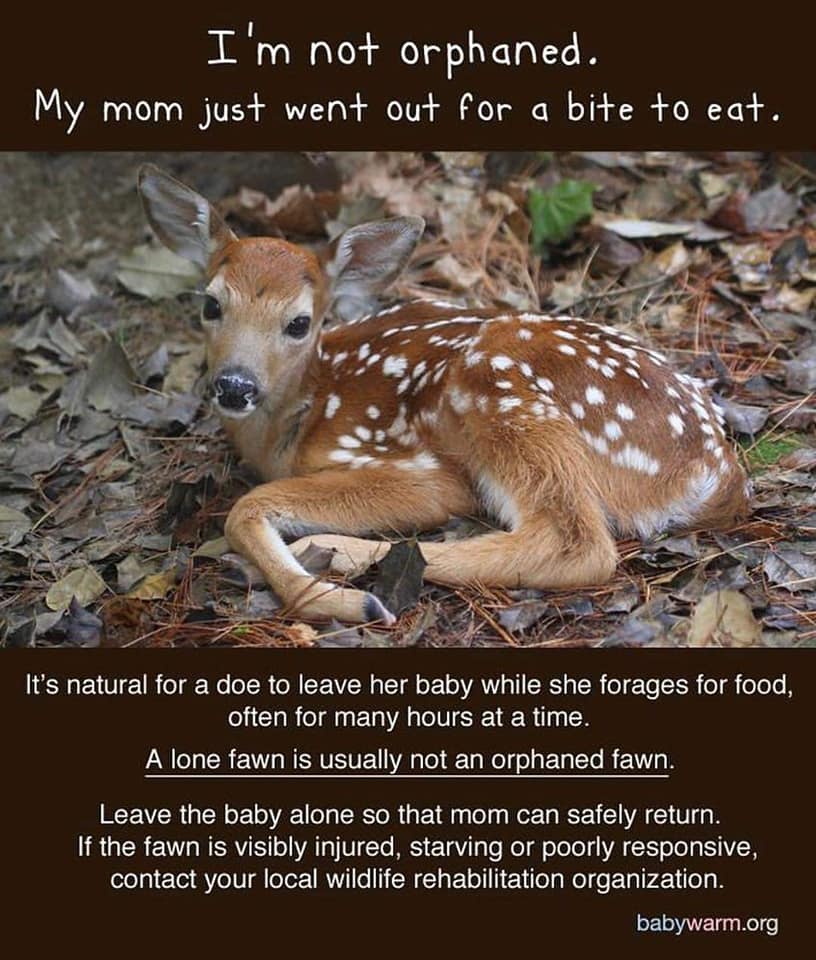Beyond Your Backyard - If You Care Leave It There
By Kimberly J. Epp
It goes without saying that baby animals are adorable. But sadly the message of orphaned wildlife bears repeating as wildlife rehabilitation centers enter their busiest time of the year. Never move a baby animal from its nesting site unless it is in obvious distress. Baby birds jump from their nest and the mother feeds them on the ground until they learn to fly. Keep your pets inside and leave the babies be.
As with most mammals, their babies are not usually orphaned and abandoned when the mother does not appear to be there. The mother is usually foraging in the area - never very far from where the youngster(s) is/are. A fawn is usually left alone, camoflaged and licked scent-free to be safe from predators. Unless the fawns ears are curled (showing it hasn't had milk for several days), leave that baby be!
Rabbits leave their young alone except when the mother feeds them. Too often baby mammals are considered abandoned and then picked up by someone. These people think they are helping and that the baby/babies are in distress. While their hearts are in the right place, quite often the mother then returns to an empty nest - and becomes quite distressed herself when she cannot find her young.
Baby Cottontail Rabbit (photo courtesey "Living Sky Wildlife Rehabilitation", Saskatoon).
Wildlife rehabbers are thus inundated with young mammals every spring. The general rule of thumb is; "If you care, leave them there". But if you are unsure, you can call the Wildlife Rehabilitation Society of SK's wildlife hotline at 306-262-7406. They will give you advice of what to do, then they will call your local rehabber if deemed necessary.
For many years, Jan Shadick of "Living Sky Wildlife Rehabilitation" in Saskatoon, rehabbed wildlife from the basement and backyard of her house. Working full time while also rescuing wildlife, she didn't have much free time! She was able to purchase a house with a huge backyard a few years back, and keeps it running with dedicated volunteers and summer students.
Orphaned 4 week old fox kit, 2018, "Living Sky Wildlife Rehabilitation", Saskatoon (photo by Kimberly Epp)
The busy time of the year is now; in early to mid Spring. Jan had over 30 baby skunks one year, and another year had 17 little baby raccoons to bottle feed! Now the raccoons go to Hayley Hesseln of "Bandit Ranch Rehab", as these babies require a lot of speciality care and work. It definitely is a lot of work caring for orphaned and injured wildlife, and Jan and her volunteers are certainly dedicated - relying on donations to help cover the costs of food, etc. It is an unpaid job, however it is most rewarding.
Here in Moose Jaw, another busy rehabber (Dr. Melanie Blager) went from working out of her house to actually purchasing farmland to house the hundreds of yearly wildlife! She also is a full-time veterinarian and cares for a wild array of orphaned wildlife, including moose calves. I remember her starting out with 40-50 animals per year, then growing to over 400 animals each year! I imagine that number has likely tripled, as she is the only rehabber in the Moose Jaw area as well as much of Regina!
Orphaned fox kit (photo courtesy "Wild and Cared Free Wildlife Rehabilitation", Moose Jaw, 2019)
Depending on which province and area you live in, you can find out the hotline in your area - and I myself always carried a wildlife emergency kit in the trunk of my car - as you never know if you may run into an emergent situation! This included the hotline telephone number, a pet carrier with blanket, bowls, bottled water, cat food, a long net, a jackknife (if an animal was entangled), etc.
Eastern Bumblebee taking sips of sugar water to regain its strength (photo by Kimberly Epp).
Remember the general rule of thumb of the Canadian Wildlife Service; "if you care, leave them there' when it comes to baby wildlife. Always be prepared however to lend a hand when it comes to animals in need. Whether it is a tired bee that needs a teaspoon of sugar water to an animal hit and left on the side of the road that needs veterinarian care, we can always show our humanity when it comes to helping others.
True humanity means helping both human and non-human beings. As Jane Goodall says, we all make a difference. You need to decide what that difference will be. I myself prefer to choose kindness and compassion. Will you take the pledge to be kind to all living things as well? Every species plays an important part in the ecosystem, and we cannot afford to lose this connected biodiversity.
🦊🦝🐀🐿🐣🐥🦡🐇🦌🦉🦆🐢🐍🦎🐝
Epp is an Environmental Educator and writer and is also the President and field trip coordinator of the Moose Jaw Nature Society.
*The next meeting (and final monthly meeting until September) is on Friday, May 24th at 6:30 PM at St. Mark's Church (60 High Street East). Kim will be providing a slide show talk of the programs she was in charge of during her past two years as president and field trip Coordinator.
The yearly AGM will follow, where positions will be voted on. If you'd like to learn more about what our nature group does, as well as hear of upcoming programs, come out and take part. The program is free of charge and refreshments will be available. Join us following the program for fellowship at Boston's Pizza (downtown location).
Kim can be reached on the MJNS Facebook page or at kepp@shaw.ca for more information, or you can call her at (306) 681-3198.





